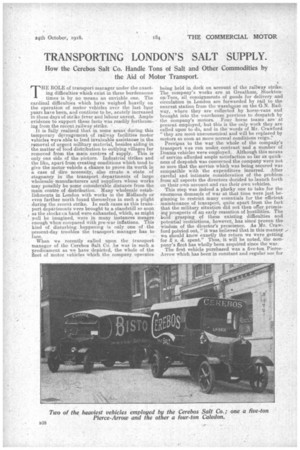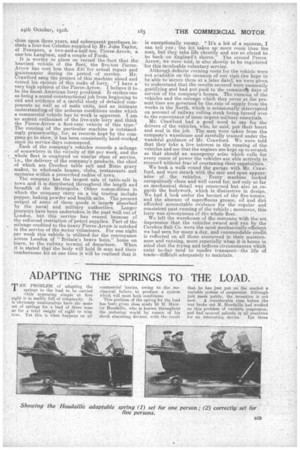TRANSPORTING LONDON'S SALT SUPPLY.
Page 8

Page 9

If you've noticed an error in this article please click here to report it so we can fix it.
How the Cerebos Salt Co. Handle Tons of Salt and Other Commodities by the Aid of Motor Transport.
THE ROLE of transport manager under the exacting difficulties which exist in these burdensome times is by. no means an enviable one. The cardinal difficulties which have weighed heavily on the operation of motor vehicles over the last fqur years have been, and continue to be, acutely increased in these days of strike fever and labour unrest. Ample
evidence to support these facts was readily forthcoming from the recent railway strike. •
it is fully realized that in some area during this temporary derangement of railway facilities motor vehicles were able to lend invaluable assistanee in the . removal of urgent military material, besides aiding in the matter of food distribution to outlying villages far removed from the main centres of supply. This is only one side of the picture. Industrial strikes and the like, apart from creating conditions which tend to give the motor vehicle a chance to prove its worth in a case of dire necessity, also create a state of stagnancy in the transport departments of large wholesale-manufacturers and suppliers whose works may possibly be some considerable distance from the main centre of distribution. Many wholesale establishments in London with works in the Midlands or even farther north found themselves in such a plight . during the recent strike. In such cases. as this transport departments were brought to a standstill so soon , as the stocks on hand were exhausted, which, as might yell be imagined, were in many instances meagre enough when compared with pre-war inflations. This kind of disturbing happening is only one of the present-day troubles the transport manager has to face.
When we recently called upon the transport manager of the Cerebos Salt Cc-s. he was in such a predicament as we have depicted, the whole of the fleet of motor vehicles which the company operates being held in dock on account of the railway Strike. The company's works are at Greatham, Stocktonon-Tees, all consignments of goods for delivery and circulation in London are forwarded by rail to the nearest station from the warehose on the G.N. Railway, where they are collected by horse-vans and brought into the warehouse previous to despatch by the company's motors. Four horse teams are at present employed, but this is the only work they are called upon to do, and in the words of Mr. Crawford " they are most uneconomical and will be replaced by metors so soon as more normal conditions reign."
Previpus to the war the whole of the company's transport was run under, contract and a number of Dennis vehicles were employed. Although this means of service afforded ample satisfaction so far as quickness of despatch was concerned the company were not so sure that the service which was being secured was compatible with the expenditure incurred. After careful and intimate consideration of the problem from all aspects the directors decided to launch forth on their own account and run their own vehicles.
This step was indeed a plucky one to take for the enormous demands of war at that time were just beginning to restrict many essentials for the efficient maintenance of transport, quite apart from the fact that the military situation did not then offer promising prospects of an early cessation of hostilities. The bold grasping of these existing difficulties and potential restrictions, however, has sinceproven the wisdom of the director's prescience. As MT. Crawford pointed out, "it was believed that, in this manner ,wa should know exactly the return we were getting for 2 s. d. spent." Thus, it will be noted, the company's fleet has wholly been acquired since the war.
The first vehicle purchased was a five-ton PierceArrow which has been in constant and regular use for close upon three years, and subsequent purchases include a four-ton Caledon supplied by Mr. John Taylor, of Penzance, a two-and-a-half-ton Pierce-Arrow, a one-ton Longhorn, and a couple of Fords.
It is worthy to place on record the/fact that the heaviest vehicle of the fleet, the five-ton PierceArrow has cost less than £10 for actual repair and maintenance during its period of service. Mr. Crawford sang the praises of this machine aloud and voiced his opinion of this make of lorry. "I have a' very high opinion of the Pierce-Arrow. I believe it to. be the finest American lorry produced. It strikes one as being a sound constructional job from beginning to end and evidence of a careful study of detailed components as well as of main units. and an intimate understanding of the arduous conditions under which a commercial vehicle has to work is apparent. I am an ardent enthusiast or the live-axle lorry and think the Pierce-Arrow a first-rate vehicle of this type." The running of the particular machine is outstandingly praiseworthy, for, as records kept 'by the company go to show, it has been consistently hard-worked since its service-days commenced.
Each of the company's vehicles records a mileage of somewhere in the vicinity of 250 per week, and the whole fleet is emPloyed on similar class of service, i.e., the delivery of the company's products, the chief of which are Cerebos table salt and Bisto gravy maker, to wholesale houses, clubs, restaurants and canteens within a prescribed radius of town.
The company has the largest sale of table-salt in town and it is distributed throughout the length and breadth of the Metropolis. Other commodities in which the company carry on a big trading include pepper, baking powder and health salts. The present output of some of these goods is largely absorbed by the naval and military authorities. Longer journeys have been undertaken in the past well out of London, but this service has ceased because of the enforced restriction of petrol supplies. Part of the mileage credited to the heavy Pierce-Arrow is notched in the service of the motor volunteers. For one night per week this vehicle is utilized for the conveyance across London of "Britain's brave boys," home on leave, to the railway termini of departure. When it is stated that the body will hold 35 men and their cumbersome kit at one time it will be realized that it is exceptionally roomy. "It's a bit of a squeeze, I can tell you ; the kit takes up more room than the men, but they take life cheerily and are so elated to be back on England's shores." The second Pierce Arrow, we were told, is also shortly to be registered for this invaluable voluntary service.
Although definite running costs for the vehicle were not availtille on the occasion of our visit (we hope to be able to secure them at a later date); we were given to understand that the results secured were eminently gratifying and had put paid to the remain" days of service of the company's horses. The running of the vehicles and the mileage which they cover at the present time are governed by the. rate .of supply from the works in the North, which is occasionally interrupted on account of railway rolling stock being turned over to the conveyance of more urgent military essentials. Mr. Crawford had a good word to say for the drivers of the vehicles, who, he said, put their heart and soul in the job. The men were taken from the company's warehouse and carefully trained under the watchful guidance of Mr. Crawford. We were told that they take a live interest in the running of the
vehicles and see that the engines are kept up to scratch so that should an emergency arise which calls for
every ounce of power the vehicles are able actively to respond withOut fear of overtaxing their capabilities., We took a walk round the garage with Mr. Crawford, and were struck with the spic and span appear ance of the vehicles. Every machine looked scrupulously clean and well cared for, not only so far as mechanical detail was concerned but also as re gards the bodywork, which is, distinctive in design. We had 5, look under the bonnet of the five-tonner, and the absence of superfluous grease, oil and dirt afforded accountable evidence for the regular and consistent past running of the vehicle ; moreover, this lorry was synonymous of the whole fleet.
We left the warehouse of the comnany with the set impression ' that the vehicles ownedand run by the
Cerebos Salt Co. were the most Mechanically-efficient we had seen for many a day, and commendable credit is reflected on all those concerned in their mainten ance and running, more especially when it is borne in mind that the trying and tedious circumstances which exist to-day tend to render transport—the life of trade—difficult adequately to maintain.






















